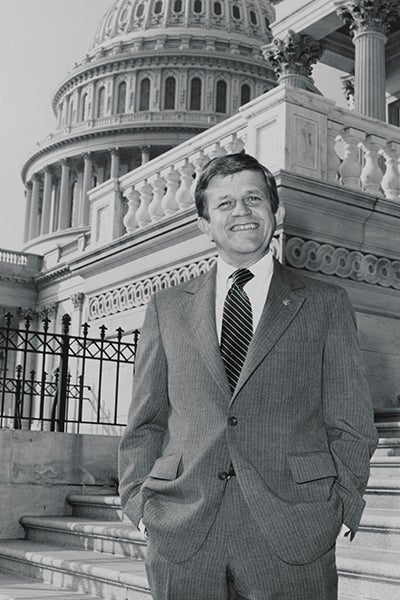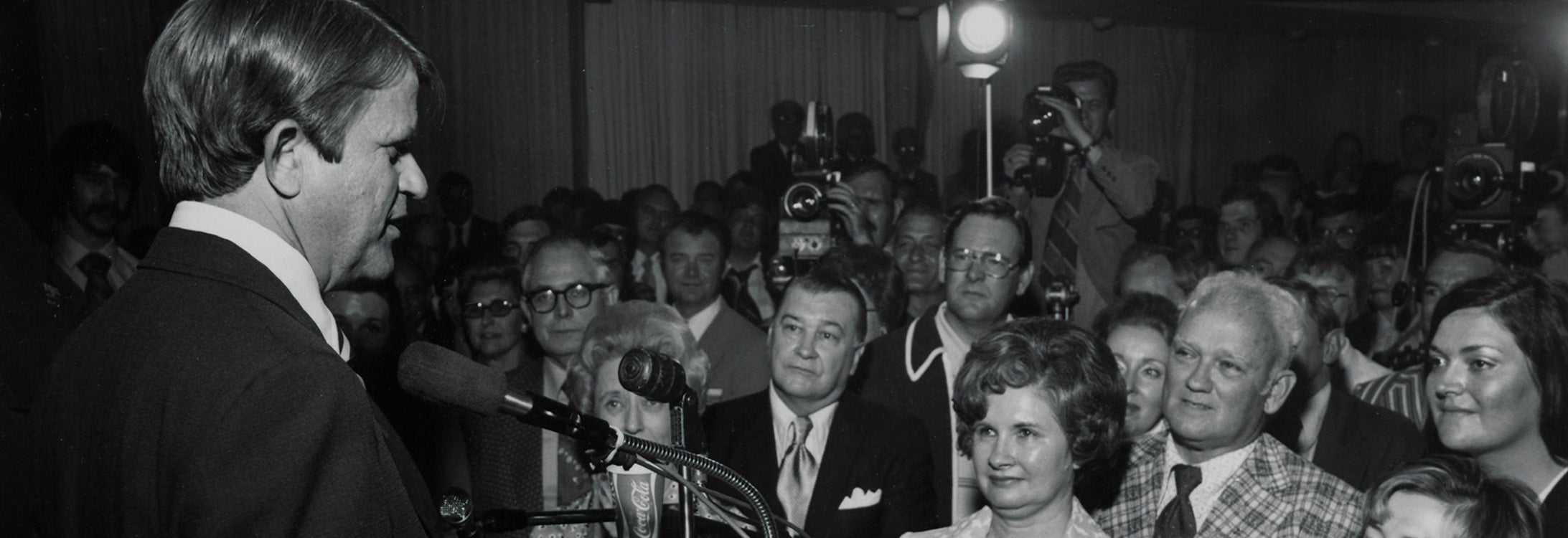Two new winners of Morgan Papers research award
Extensive research conducted by James Stroud and Elise White earned them each the Senator Robert Morgan Papers Student Research Award.
They used the Robert Morgan Papers Collection (#0268), available in Joyner Library’s Special Collections, and other sources to form and author unique publications available in The ScholarShip, ECU’s Institutional Repository. Stroud’s paper is titled, “Favorable Winds: Robert Morgan & the Circumstances of the 1974 Election Year.” White’s project is titled, “Justice Deferred: Antidumping Legislation in the Robert Morgan Collection.”
Stroud was a senior when he submitted his paper. White was dually enrolled as an ECU first-year student and a junior in the Innovation Early College High School. An awards ceremony also will recognize their efforts.
“Their extensive research used not only the Morgan Papers, but numerous other primary and secondary sources,” library director Jan Lewis said. “They weaved their research into compelling narratives; in one case of Senator Morgan’s first campaign for the U.S. Senate, and in the other case, one of his legislative accomplishments as a senator. Both papers tied his accomplishments to his core value of integrity and to his work as attorney general of North Carolina in the area of consumer protection. I hope that their papers will inspire other students to use the Morgan Collection and apply for this research award.”
Morgan is a 1947 East Carolina Teachers College alum. One of the research award judges was Carroll Leggett, who was chief of staff for Morgan.
“Applause for White for finding a totally unexplored aspect of Senator Morgan’s service for her research project,” Leggett said. “I am amazed. I was there in the midst of things, but have no recollection of Senator Morgan’s involvement in the passage of this anti-dumping legislation. … Her research here was no easy matter. We thank her for this addition to the Robert B. Morgan Collection at Joyner Library.”
Library employee Kristen Daniel, instruction and outreach librarian in Special Collections, also was a judge. Daniel said she enjoyed the narrative style used by Stroud, who uses background and research of President Richard Nixon and the Watergate scandal to argue that Watergate only played a tangential role in Morgan’s victory.

Then-U.S. Sen. Robert Morgan pictured in front of the Capitol Building, Oct. 23, 1979.
“The paper overall was very informative, well-organized and structured,” Daniel said. “The research question and author’s conclusion are clearly outlined in the introduction, and based on the bibliography, the Robert Morgan Papers were well utilized to write the paper.”
Morgan was born nearly 100 years ago, on Oct. 5, 1925, in Lillington and first attended ECTC in 1942-43 before being drafted into the Navy. Later as a state senator, he helped his alma mater gain university status and add a medical school. He served as North Carolina attorney general from 1969-1974, lauded for establishing a consumer protection office, and then won U.S. Senate election to help North Carolinians while focusing on issues such as the energy crisis and disability rights. He served in the U.S. Senate from 1975 until 1981.
“I am so impressed and excited by both papers,” said Margaret Morgan Holmes, daughter of Robert Morgan. “Mr. Stroud seems to find it significant that my father refused to capitalize on the Watergate scandal or to personally attack President Nixon, instead choosing a more positive campaign highlighting his own strengths. And through her well-researched project, Ms. White reveals my father Robert Morgan’s support of American industry and fair trade, an area of interest of which many North Carolina historians may not be aware. I appreciate the depth of her research into a lesser-known part of his legislative and political career.”
